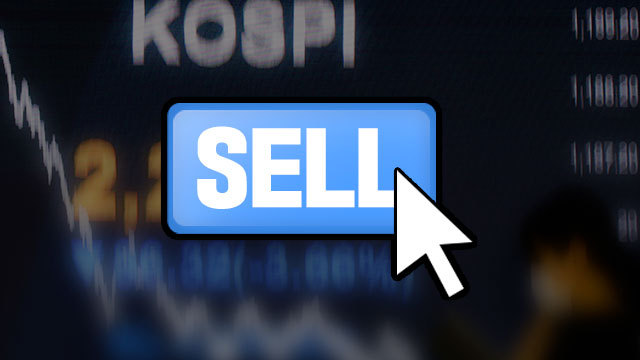As Kospi recovers, foreign ownership hits 42-month low
By Jie Ye-eunPublished : Aug. 23, 2020 - 14:45

Foreign stock ownership of South Korea’s main bourse Kospi dipped to a 42-month low in August due to their massive selling amid a faster-than-expected recovery of the coronavirus-affected market, data showed Sunday.
The average monthly ownership of foreign investors came to 35.78 percent of the bourse’s market capitalization this month, the lowest monthly average since Feb. 2017, when it was 35.74 percent, according to data from the bourse operator Korea Exchange.
Since the main bourse hit its yearly rock bottom on March 19 at 1,457.64, offshore investors sold a net 12.7 trillion won ($10.66 billion) worth of local shares. From Aug. 18 to Friday, they dumped 274 billion won of stocks. As a result, foreign ownership of Kospi stocks dropped from 39 percent on March 19 to 35.66 percent on Friday.
Market watchers attributed offshore investors’ massive sell-off to the slower economic recovery of emerging nations, including Asia’s fourth-largest economy.
“It is hard to generalize a conclusion that foreign investors only sold their shares in the local stock market. Since countries such as Brazil, Russia and Indonesia -- where their markets are led by raw materials -- still struggle with the COVID-19 pandemic risks, foreigners’ negativity toward emerging markets affected their massive off-load from Korea’s stock market as well,” said Kim Yong-koo, an analyst at Samsung Securities.
Amid the global economic depression of the COVID-19 pandemic, a majority of investors’ preferred investment destination tended to be advanced countries reserving key currencies, rather than emerging nations with high export dependencies. But foreigners’ continuous selling-spree is likely to show a contrary investment trend, the experts said.
“It would be premature to say that foreigners will (continue to) take their hands off the local stock market,” said Lee Kyung-soo, an analyst at Hana Financial Investment. “When markets in advanced economies hit the balance, they will eventually flow down to the (Korean) market.”
The timing of macroeconomic recovery along with development of a virus cure and vaccines will also affect highly on foreign investor sentiments, at least towards emerging markets, Kim of Samsung Securities added.
By Jie Ye-eun (yeeun@heraldcorp.com)








![[Graphic News] More Koreans say they plan long-distance trips this year](http://res.heraldm.com/phpwas/restmb_idxmake.php?idx=644&simg=/content/image/2024/04/17/20240417050828_0.gif&u=)
![[KH Explains] Hyundai's full hybrid edge to pay off amid slow transition to pure EVs](http://res.heraldm.com/phpwas/restmb_idxmake.php?idx=644&simg=/content/image/2024/04/18/20240418050645_0.jpg&u=20240419100350)






![[From the Scene] Monks, Buddhists hail return of remains of Buddhas](http://res.heraldm.com/phpwas/restmb_idxmake.php?idx=652&simg=/content/image/2024/04/19/20240419050617_0.jpg&u=20240419175937)

![[KH Explains] Hyundai's full hybrid edge to pay off amid slow transition to pure EVs](http://res.heraldm.com/phpwas/restmb_idxmake.php?idx=652&simg=/content/image/2024/04/18/20240418050645_0.jpg&u=20240419100350)

![[Today’s K-pop] Illit drops debut single remix](http://res.heraldm.com/phpwas/restmb_idxmake.php?idx=642&simg=/content/image/2024/04/19/20240419050612_0.jpg&u=)